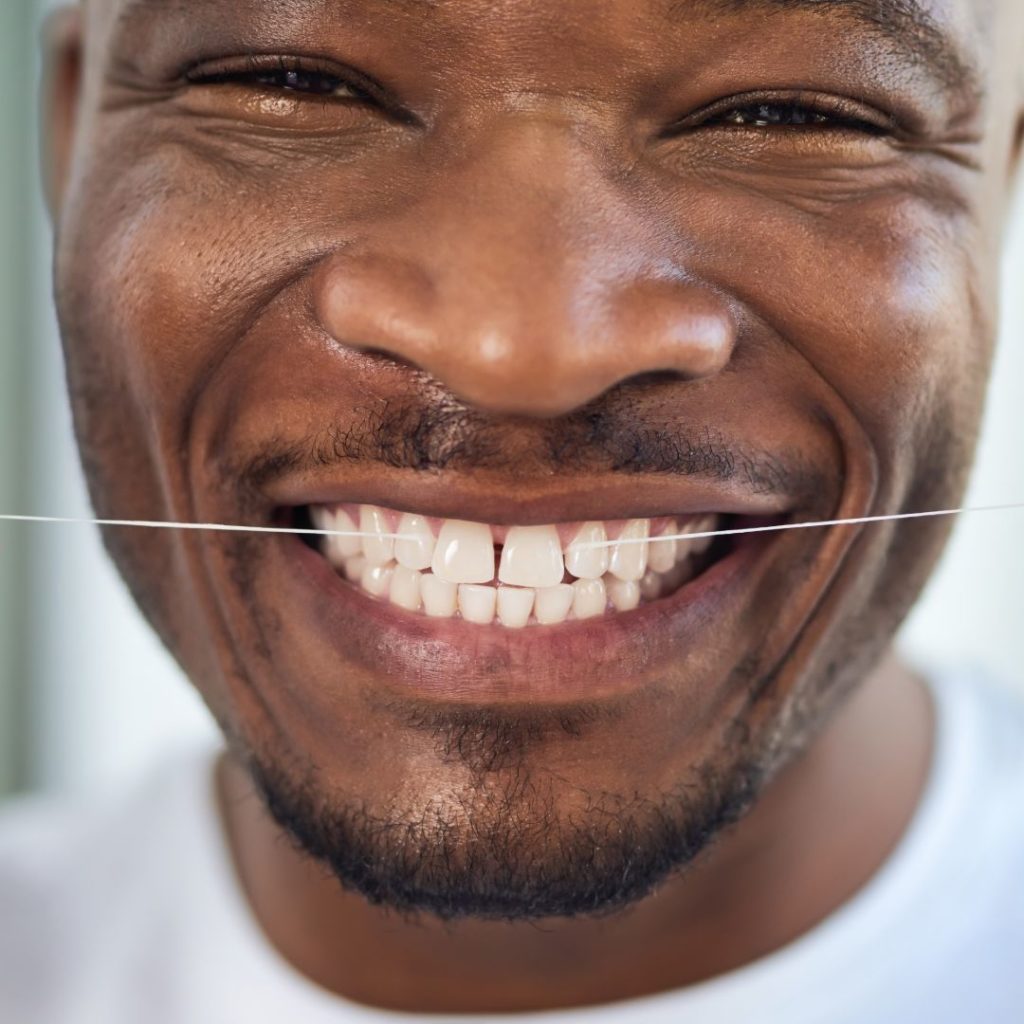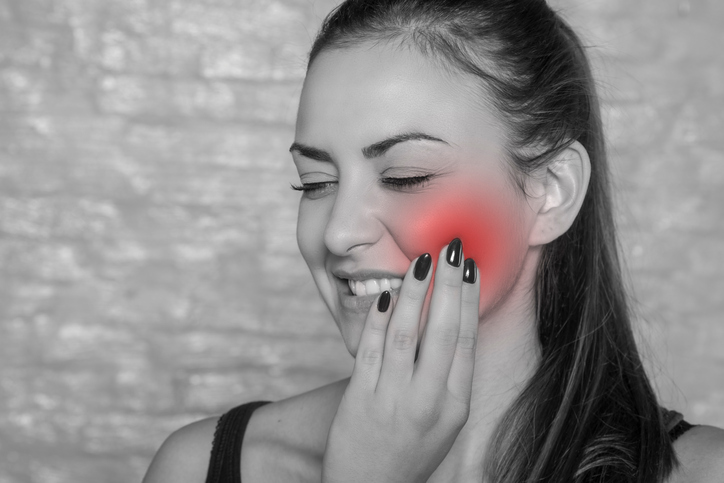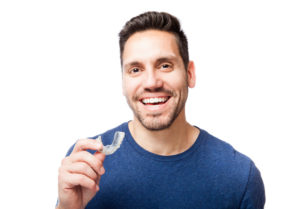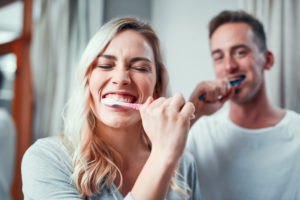Blog
Closing the Gaps on Imperfection

Ok. Maybe you don’t expect for your smile to be 100 percent perfection. However, if gaps between the teeth that make up your smile are causing self-consciousness, they have to go. A skilled dentist has several ways to make this happen. Fortunately, none of them are particularly complicated. If you are ready to see the smile you have always envisioned for yourself, one without gaps, read on to discover your options.
Bonding
Dental bonding is a relatively common cosmetic procedure intended for the correction of minor flaws. For example, a dentist may apply composite resin bonding material to a tooth that has chipped or cracked. The bonding material is the same that is put into a cavity to restore damage without affecting the natural appearance of the tooth. While there are advantages to direct bonding, using this technique for a gap may not be ideal due to the bite force that occurs in front teeth.
Porcelain Veneers
Veneers have become a popular cosmetic technique to address a wide range of smile concerns. Where dental bonding can last as little as a few months or as long as about 8 years, porcelain veneers have a lifespan of up to 15 years or longer with excellent care. To cover a gap with veneers, we schedule two appointments. The first is reserved for preparation and impressions. After slightly reducing surface enamel, we take impressions to obtain a model of the teeth the surround the gap. Veneers are then made in a dental lab to be slightly wider than natural teeth. Where natural teeth stop, the new veneers will meet at the center of the gap. The final product is bonded to teeth during the second and final visit.
Invisalign
Orthodontic treatment was historically necessary for people who wanted to close gaps in their smile. While we now have more options to cosmetically disguise gaps, there are benefits to physically closing space in between teeth. Fortunately, we can do this without disrupting a person’s life too much. Invisalign treatment is an excellent option for people who want to reposition their teeth permanently. When this approach is taken, the only form of maintenance that is needed is general upkeep to oral health.
We can help you love your smile. To schedule a consultation with Dr. Price, call (703)-935-2879.
Posted on July 30th, 2019
How Can I Replace Damaged or Missing Teeth?

Tooth damage is sometimes unavoidable, as is tooth loss. In our Burke office, patients of Dr. Price can explore several restorative options to get their smile back. The tooth replacement options that are used today each seek to improve the appearance of the smile after tooth loss. Additionally, modern restorations are affixed in a way that also restores optimal chewing function. Here, we discuss a few of the common ways in which teeth can be replaced.
Dental Bridge
A dental bridge is a fixed restoration that can replace up to a few teeth that sit side-by-side. Various dental bridge options exist, including what is called a cantilever bridge that attaches to only one natural tooth rather than two. A standard dental bridge has two crowns with one or more artificial teeth in between. The crowns are cemented to natural teeth to stabilize chewing, bite, and speech.
Dentures
Dentures are typically removable, stabilized either by dental adhesive or clasps. A partial denture may look somewhat like a dental bridge, with lifelike artificial teeth and a small acrylic “gum.” Partial dentures attach to adjacent teeth with hidden clasps and are removed regularly for cleaning. A full denture sits on top of the gums and is made to fit in a way that provides natural suction to hold artificial teeth and gums in place. In many instances today, patients choose to combine full dentures with dental implants.
Dental Implants
This form of tooth replacement is not a treatment in and of itself. Dental implants are a base for a crown, a bridge, or a denture. Implants are very small cylinders made of titanium. Their role is to sit in the jawbone where natural roots once existed. With implants, we not only gain full stability for artificial teeth but we also recreate the stimulating structure that is necessary to prevent accelerated bone loss.
Learn More About Tooth Replacement
Each tooth replacement technique has advantages and disadvantages. To learn more about these options, schedule a consultation in our Burke office at (703)-935-2879.
Posted on July 15th, 2019
Dental Tips for a Happy, Healthy Summer Vacation

As the time approaches for school to be out of session, many families are looking forward to some time away from home. Summer road trips and vacations are meant to be fun and relaxing. An unexpected dental problem can significantly interfere with this ideal. Therefore, it is beneficial to look at ways to reduce the risk of unwanted surprises.
Oral Health Needs Consistent Attention
We know we need to take good care of our teeth if we want to avoid painful cavities. The value of daily hygiene is much more extensive than that. Oral health is integral to general physical wellness, long-term health, appearance, confidence, and peace of mind. We could go on, but you get the picture. A healthy practice needs to be established and maintained whether at home or across the country. What might that look like? Fortunately, it looks pretty easy:
- Maintain a clean mouth with daily brushing. Before heading off on vacation, take a good look at everyone’s toothbrush. Have they been changed recently? Are the bristles bent? It may be time for a change. Studies show that kids and adults like the clean feeling they get from an electric toothbrush. Just remember, the toothbrush itself only does part of the work. It is necessary to make sure all surfaces of teeth are touched for several seconds before moving on the next step.
- As you may have guessed, the next step in oral health maintenance is to floss. This habit should not be forgotten while on vacation. Make it fun, if need be, by getting flavored floss that cleans and refreshes at the same time.
- Drink water. When on a long drive or out seeing the sights, it can be easy to do one of two things: forget to drink altogether or reach for sugary, flavorful beverages. Drinking water throughout the day is vital to disrupting the acid-bacteria cycle in the mouth. Don’t down it all in the morning or save it all for the afternoon. The trick to drinking water is to sip it throughout the day.
- Watch the snacking. The more often we eat, the more we increase the acidity in the mouth. This is especially true when snacks include things like chips, crackers, cookies, and other starchy or sugary foods. As an alternative, provide the family with fresh fruits and vegetables. The crunchier the better.
Schedule a Pre-Vacation Checkup
One of the best things you can do to ward off sudden dental problems on vacation is to see your dentist. We’re happy to schedule your checkup and cleaning in our Burke office at (703)-935-2879.
Posted on June 30th, 2019
Are Plaque and Tartar the Same?

You may have heard the terms “plaque” and “tartar” and made the assumption that they are interchangeable; that they are, in fact, one and the same. This is an understandable mistake because both words are used in conversation regarding gum disease. Both are named as contributing factors to the onset of inflammation and infection. Here, we break down the differences between plaque and tartar. They matter!
What is plaque?
Plaque is a substance that sticks to tooth enamel. Often, it accumulates along the gum line. This colorless, sticky film is made up of saliva, tiny particles of food debris, and bacteria. You may not be able to see plaque but you can feel it; it’s that fuzzy feeling against your tongue that you sense when you haven’t yet brushed your teeth.
We all get plaque. This film develops as a natural response to the sugar and starches in the foods we eat. It develops in the hours between brushing and flossing. If oral hygiene is not sufficient (lasting two full minutes before flossing), plaque may build up right away after leaving the sink. Plaque is acidic in nature, so is a precursor to tooth decay, gum disease, and bad breath.
What is tartar?
Plaque is a concerning problem on its own; and yet, there’s more. Tartar, also called calculus, can significantly degrade oral health. This substance is the hardened, stuck-on film that was once plaque. Because tartar has solidified, it sticks to teeth until removed with a special instrument. Like plaque, tartar is also acidic. Allowed to remain on the teeth for too long, this hardened film can stretch beneath the gum line, where it can provoke infection in soft and hard tissues, namely the root of a tooth or teeth.
Protect Oral Health by Preventing Plaque and Tartar
We can’t overstate the value of good oral hygiene. It’s the way to prevent plaque buildup and, by default, also the way to prevent tartar. To protect your teeth and gums, consider the following suggestions:
- If it’s been more than a few months since you’ve replaced your toothbrush, do so as soon as possible. Consider an electric or sonic toothbrush. Your toothbrush needs to be changed about every three months.
- Brush your teeth for a full two minutes, twice a day. Pay close attention when brushing so you touch all surfaces of each tooth.
- Floss daily. If you have difficulty reaching the back of your mouth, purchase a flossing tool from your local pharmacy. If you need help learning how to floss, talk with your dentist.
- If possible, snack on a crunchy fruit or vegetable every day. This will naturally scrub your teeth and also dilute sugar residue that encourages plaque.
- Visit our Burke office twice a year for a thorough dental exam and cleaning.
We’re here to help you avoid the preventable dental problems that cause stress and pain. Schedule your visit at (703)-935-2879.
Posted on June 15th, 2019
Setting the Record Straight on Dental Myths

Dental health is something that a person will manage for their entire lifetime. The more informed one is, then, the better they will fair as they face various situations that may degrade their teeth and gums. Here, we discuss a few wrong ideas that need to be set straight.
Adults are much less likely to get cavities than children.
In the last twenty or so years, tooth decay in school-aged children has been significantly reduced thanks to fluoridated water, fluoride treatments, and dental sealants. Conversely, statistics indicate that tooth decay among older adults has increased. One of the common contributing factors to tooth decay in seniors is dry mouth. This condition may stem from diabetes, medication, or chronic dehydration. Routine dental care can identify a person’s risk for tooth decay and establish protocols to reduce this risk.
For a toothache, place an aspirin next to the painful tooth.
This idea is one that needs to be tossed as quickly as possible. Aspirin can be taken orally to reduce the discomfort of a toothache but should never be placed directly against gum tissue. The highly acidic nature of aspirin could injure soft tissue and create an even bigger problem than the original toothache. Clove essential oil may be applied to the gums to minimize tooth pain. However, a toothache should also be quickly examined by a dentist. The sooner that care is obtained, the less extensive it will be.
All fillings need to be replaced at some point.
This used to be the case and still is the case with amalgam (silver) fillings. The reason these fillings eventually fail is because the metal in amalgam expands and retracts with temperature changes in the mouth. Over time, this movement can cause separation at the margins of the filling. Metal fillings can also crack or fracture when they become old. Newer materials such as composite resin are much more compatible with natural tooth enamel. These restorations have been known to last decades.
Knowing how to manage dental situations can be difficult sometimes. That’s why we’re here. Our team offers friendly care that focuses on preventing and restoring teeth to optimal health. To schedule an exam and cleaning with us, call (703)-935-2879.
Posted on May 30th, 2019
Dental Situations The Average Teen May Encounter

We are privileged to be a Premier Invisalign provider for teens and adults in Northern Virginia. Our patients allow us to better understand the unique situations that young people face as their dental anatomy reaches maturity. The teen years are a pivotal time during which each child transitions into a much more independent state. This independence means that the teen is learning to make choices for themselves and, as it would be, more choices means more chances for mistakes. Because dental health can go downhill quickly, we want to discuss some of the situations teens may face and how to continue fostering good habits.
Changing Body Chemistry
Physical and chemical changes begin between age 11 and 14 for most kids. The increase in estrogen in girls inherently increase gum inflammation simply because blood flow intensifies in response to this hormone. The physical development during the teen years also calls for more calories. Teens often get these additional calories from foods that could damage their teeth. Sugar feeds bacteria, which creates acidity in the mouth, which eats away healthy enamel and gum tissue. It’s a simple process that can occur around the clock but one that can be managed with good eating habits and routine oral care. Teens are encouraged to consume crunchy foods as a way to remove acidic plaque, to drink water throughout the day, and to spend two minutes brushing their teeth every morning and night. Flossing should be performed every night before bed.
In addition to sugary foods, many of the beverages that teens tend to enjoy are highly acidic. In recent years, dentists have encountered increasing instances of tooth erosion. This is different than tooth decay (cavities). Erosion is more widespread and caused by acidic substances sitting on the teeth. Erosion can lead to discoloration and an increased risk for tooth fractures.
Changing Trends
Body piercings have been popular for decades. Recently, trends have extended to include piercings in a variety of areas of the body, including the mouth. According to studies, approximately 20% of people who get an oral piercing such as a tongue piercing will experience gum recession or a tooth fracture. This is not to say a parent should forbid their teen from getting their desired piercing but that teens and parents need to be aware of the risks and establish the best possible habits to avoid them. For example, flossing daily as a way to minimize gum recession.
Our work with teens and young adults is something we greatly enjoy because we understand the risks they face and their need for ongoing encouragement to take responsibility for their long-term oral health. Get your teen the care they need. Schedule a visit in our Burke office today.
Posted on May 15th, 2019
Dental Implant FAQs
 Dental implant treatment has become increasingly relevant in the tooth-replacement conversation. Many people have heard the term dental implants but aren’t quite sure what this treatment entails or what it might do for them. Here, we provide answers to several of the questions we frequently hear.
Dental implant treatment has become increasingly relevant in the tooth-replacement conversation. Many people have heard the term dental implants but aren’t quite sure what this treatment entails or what it might do for them. Here, we provide answers to several of the questions we frequently hear.
What are dental implants?
Dental implants are tiny posts made of surgical grade titanium. These posts are inserted into the jawbone, where they gradually become surrounded by bone tissue. The purpose of a dental implant is to serve as a new root for an artificial tooth that will be affixed after the implant has fully integrated into the bone.
Does it hurt to get a dental implant?
The dental implant procedure is not painful. Before commencing with treatment, a local anesthetic is injected into the gums. This will block sensations in the nerves around the treatment area. As implants are inserted, patients may feel slight pressure, similar to the sensation of getting a dental filling or having a root canal. Post-treatment comfort also returns quickly; many patients return to work the day after their procedure.
Why are dental implants necessary?
The reason why dental implants were developed was that we needed better solutions for tooth loss. Losing a tooth also means losing its root system. Research has shown that, when we chew, vibrations travel through the tooth and its roots down into the jawbone. It is believed that these vibrations stimulate bone tissue to regrow. When the root and tooth no longer exist, the jawbone regenerates at such a slow rate that it actually degrades over time. Bone loss can change dentition and also, if extensive, change the shape of the face.
Are dental implants worth the cost?
We all like to know that we are getting a good return on any investment we make. The cost of dental implant treatment may look higher than alternative treatments like dentures at first glance. However, when we take into account the fact that dental implants can last forever and that, by supporting bone structure, may decrease the number of denture relines or replacements that are necessary, we gain a better understanding of the cost-effectiveness of this treatment over the long-term.
Have you been wondering about dental implants and what they can do for you? Let’s talk. Call to schedule a visit to our Burke office at (703)-935-2879.
Posted on April 30th, 2019
Myths and Facts about Root Canal Therapy
 Root canal therapy is a common dental treatment that is performed when a tooth has become deeply infected. Most people have heard stories about this beneficial dental procedure that don’t paint the best picture. The myths that revolve around root canal therapy can create so much confusion that a person may not know what to do when told they need this treatment. Here, we offer facts to offset the myths that may prevent you from obtaining the care you need to up-level your oral health.
Root canal therapy is a common dental treatment that is performed when a tooth has become deeply infected. Most people have heard stories about this beneficial dental procedure that don’t paint the best picture. The myths that revolve around root canal therapy can create so much confusion that a person may not know what to do when told they need this treatment. Here, we offer facts to offset the myths that may prevent you from obtaining the care you need to up-level your oral health.
MYTH: A root canal is a painful dental procedure.
The fact here is that most dental treatments were pretty uncomfortable at one time. When we say “at one time,” we mean over a century ago! Since the dawn of dentistry, a lot has changed. Where anesthetic was once lacking, it is now readily available. This is to say that, should you undergo a root canal, your dentist will numb your tooth first. If you’ve ever had a dental filling, you have a good idea of what it would feel like to have a root canal. The primary difference between the two is not a sensation but the time it takes to complete treatment. It’s that simple.
MYTH: A root canal is only necessary when you have a bad toothache.
Fact: Some people do experience pain that stems from an infection in the pulp chamber of a tooth. However, this is not guaranteed. An example of this is when a tooth’s blood supply is poor or non-existent or the tooth is no longer vital. Even without pain, an infection can occur and be seen on dental x-rays.
Myth: Pain goes away immediately after a root canal.
Fact: The primary benefit of root canal therapy is thought to be pain relief. Judging by the fact that a tooth may not even hurt before treatment, we can see this is a myth. Many people believe that, if they do have pain, it will be immediately relieved after their root canal has been treated. Sometimes, pain decreases gradually and may still feel sore for several days after treatment. This doesn’t indicate that a root canal has failed, just that there may be some lingering inflammation.
There is no reason to fear root canal therapy. Your comfort and future oral health are important to us and we take care of the recommendation and performance of dental procedures. For more information or to schedule your visit in our Burke office, call (703)-935-2879.
Posted on April 15th, 2019
Here’s How Invisalign Beats Braces
 For the years that we have been a premier Invisalign provider in Northern Virginia, we have seen this method of teeth-straightening skyrocket. Who doesn’t love the idea of having a better smile; one that not only looks more attractive but is truly healthier because teeth are straight! We understand the reason for Invisalign’s popularity, and we’ll point out a few of the benefits that our patients appreciate here.
For the years that we have been a premier Invisalign provider in Northern Virginia, we have seen this method of teeth-straightening skyrocket. Who doesn’t love the idea of having a better smile; one that not only looks more attractive but is truly healthier because teeth are straight! We understand the reason for Invisalign’s popularity, and we’ll point out a few of the benefits that our patients appreciate here.
#1 – Comfort
There’s no other way to say it than braces can be rough on the mouth. Having metal brackets cemented to individual teeth presents the immediate challenge of small fixtures protruding from the surface of teeth. The brackets can rub on the inner cheek and lips and may even catch on tissue now and then. To resolve this issue, the patient with braces must resort to applying wax over the corners of the annoying bracket to soften its edges. Invisalign has no brackets, only smooth plastic trays that fit over teeth.
#2 – Appearance
It has been decades since having a “metal mouth” was actually in style. If you weren’t around at that time in history, you may be surprised to even hear that people truly wanted to have gold and silver crowns placed over front teeth to achieve a particular look. We’ve come a long way since that trend, and now most people want to preserve their natural smile all the time, even when straightening their teeth. The clear plastic from which Invisalign aligners is made enables our patients to do that.
#3 — Gentler, Kinder Treatment
Force is a necessary aspect of any treatment that aims to straighten teeth. However, the immense pressure placed on certain teeth during standard orthodontic treatment may be too much. It is believed that, in some cases, the pressure on a tooth causes hidden damage that may not manifest until years later. At that time, a root canal may be needed to treat the damaged root. The cementing of brackets and placement of bands around those brackets may also present a risk for tooth decay during orthodontic treatment. Not only are bacteria attracted into the small spaces around brackets, but this space is also difficult to reach when brushing. Invisalign aligners are removable. There is nothing to brush around. Flossing is even easy with Invisalign!
We’re huge fans of Invisalign, and our patients are, too. To schedule a consultation in our Burke office and see what Invisalign can do for you, call (703)-935-2879
Posted on March 30th, 2019
Could an Electric Toothbrush Make Your Life Better?
 When you visit the dentist for your semi-annual exam and cleaning, you most likely leave the office with a nice new toothbrush in hand. This is a longstanding practice in most dental offices, but we think our patients could do better. Here, we discuss why more and more dentists and hygienists are recommending that people of all ages use an electric toothbrush. In fact, the American Dental Association just gave the ADA Seal to the Oral-B Oscillating-Rotating-Pulsating Power Toothbrush, so your local dentist isn’t the only one in on the secret.
When you visit the dentist for your semi-annual exam and cleaning, you most likely leave the office with a nice new toothbrush in hand. This is a longstanding practice in most dental offices, but we think our patients could do better. Here, we discuss why more and more dentists and hygienists are recommending that people of all ages use an electric toothbrush. In fact, the American Dental Association just gave the ADA Seal to the Oral-B Oscillating-Rotating-Pulsating Power Toothbrush, so your local dentist isn’t the only one in on the secret.
What Makes an Electric Toothbrush Better?
If you’ve ever had an electric toothbrush, you may remember that brushing your teeth with your nifty instrument was pretty fun. Because the head of the brush spins or vibrates in some way, there is very little left for you to do other than hold the bristles against your teeth. During a two-minute window of time, just move the toothbrush from one tooth to the next and over all surfaces of each (front, back, and surface) and, voilà! Clean teeth!
Electric Toothbrushes are great for nearly everyone. In particular, a powered toothbrush provides specific benefits in a number of circumstances, such as:
- The aggressive brusher. Many people, in an effort to do the best possible job cleaning their teeth, go at it a little too hard. Brushing with a lot of pressure on the bristles of your toothbrush can scratch the gums where they meet the teeth. Abrasive brushing can actually lead to gum recession and inflammation. A manual toothbrush gives you the feeling of cleanliness without having to be rough with your gums.
- The apathetic brusher. We all know that brushing our teeth can be a rather boring chore. Using an electric toothbrush doesn’t minimize the amount of time you should brush; you still need to keep it up for a full two minutes, but it can make the time pass more quickly.
- Children brushers. Kids love fun gadgets, which means most appreciate a good electric toothbrush. Using a rotating, vibrating toothbrush, a child may be more motivated to develop good oral hygiene practices.
- Senior brushers. By their senior years, most people have a good handle on their teeth-brushing techniques. The problem is, their hand dexterity may not allow them to brush as well as they used to. An electric toothbrush can increase efficiency and decrease instances of hand pain from moving the toothbrush rigorously.
We’re here to help our patients enjoy good oral health for life. To schedule a visit at our Burke office, call (703)-935-2879
Posted on March 15th, 2019

